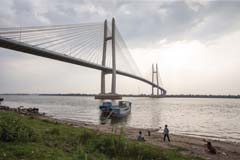Japan's Development Assistance,' a Critical Review of the History of Japan's ODA, Is Published
2015.12.14
"Japan's Development Assistance: Foreign Aid and the Post-2015 Agenda," was published by Palgrave Macmillan in November 2015.
The book's publication in 2015 is intended to make a timely contribution to the current and future debate on the shape of development cooperation, as the international community is set to intensify its effort toward achievement of the Sustainable Development Goals agreed to in September of 2015, and to join forces to combat global climate change following the Paris Agreement adopted in December.
This book attempts a critical review of the 60 years of Japan's official development assistance (ODA) or, as former JICA President Akihiko Tanaka puts it, "one of Japan's major instruments of its post-World War II foreign policy - indeed, perhaps the most important."

Tsubasa Bridge in Cambodia,
constructed with Japan's cooperation
(Photo: JICA/Shinichi Kuno)
The volume is a comprehensive review of the history of Japanese ODA. Covering almost the entire post-WWII period, and looking both at bilateral and multilateral ODA, the book features 21 essays contributed by the members of a highly diverse project team. The team includes first-class researchers as well as experienced development assistance practitioners from Japan, the U.S., Europe, Asia and Africa.
The book was edited by Hiroshi Kato, JICA Vice-President (and formerly Director of JICA-RI); John Page, Brookings Institution Senior Fellow; and Yasutami Shimomura, Professor Emeritus at Hosei University.
In the summary in the final chapter, the three editors talk about the two core values visible in the history of Japan's ODA. One is "trusting the (partner) country" and the other is "working one's self out of a job," or helping recipient countries become independent of aid. The authors argue that by staying true to these fundamental precepts, Japan can adapt to a global environment in which developing countries are increasingly demanding "ownership" of their own development programs and freeing themselves from dependence on aid.
<The ExternalRelated Link>
Palgrave Macmillan

事業事前評価表(地球規模課題対応国際科学技術協力(SATREPS)).国際協力機構 地球環境部 . 防災第一チーム. 1.案件名.国 名: フィリピン共和国.

事業事前評価表(地球規模課題対応国際科学技術協力(SATREPS)).国際協力機構 地球環境部 . 防災第一チーム. 1.案件名.国 名: フィリピン共和国.

事業事前評価表(地球規模課題対応国際科学技術協力(SATREPS)).国際協力機構 地球環境部 . 防災第一チーム. 1.案件名.国 名: フィリピン共和国.

事業事前評価表(地球規模課題対応国際科学技術協力(SATREPS)).国際協力機構 地球環境部 . 防災第一チーム. 1.案件名.国 名: フィリピン共和国.

事業事前評価表(地球規模課題対応国際科学技術協力(SATREPS)).国際協力機構 地球環境部 . 防災第一チーム. 1.案件名.国 名: フィリピン共和国.
scroll